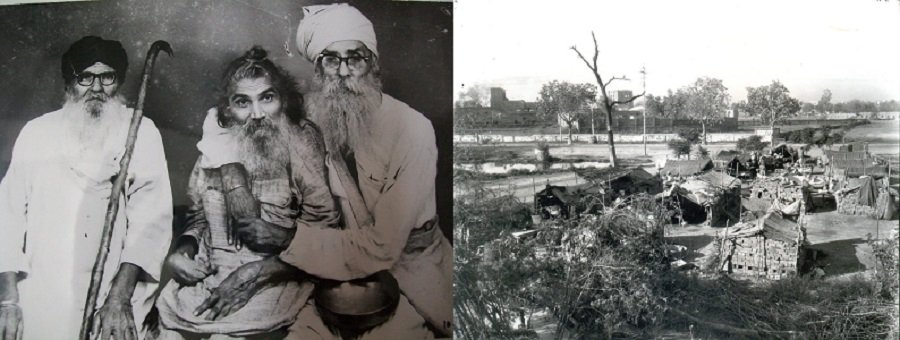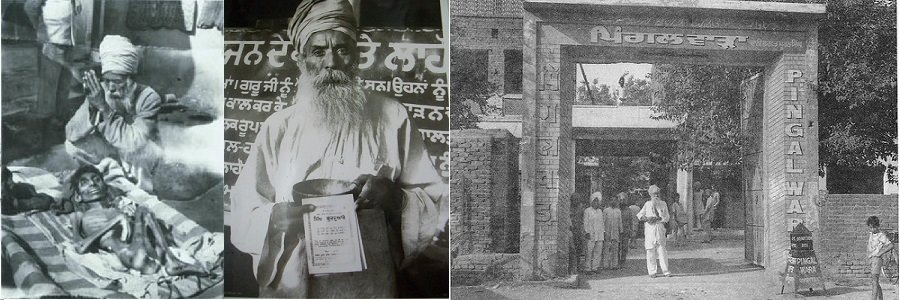Pingalwara
The Amazing Story of Pingalwara and Bhagat Puran Singh
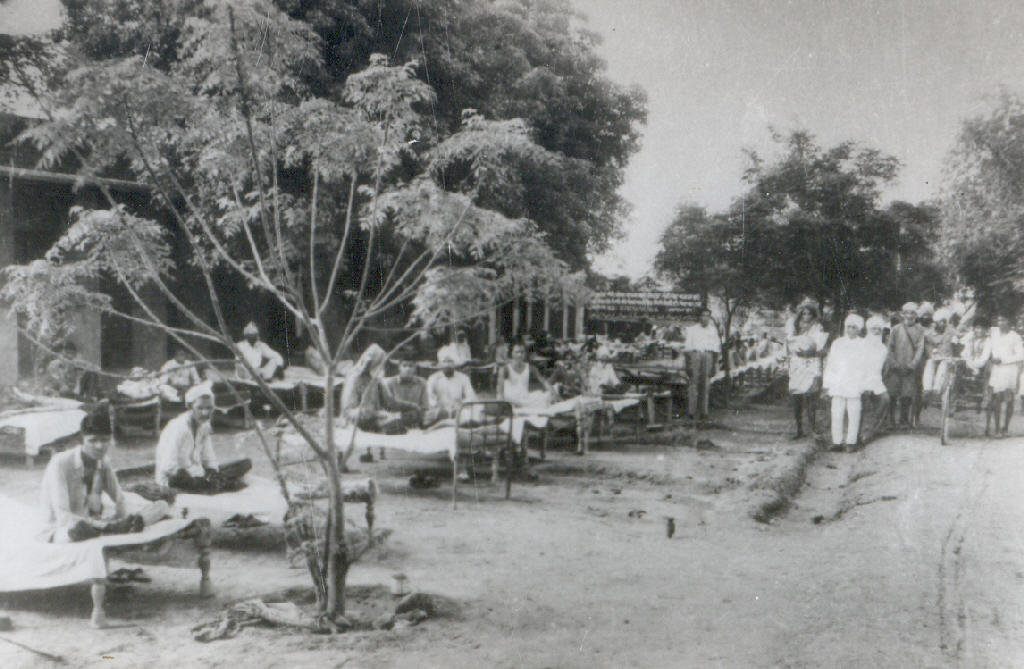
Early Pingalwara in 1956 |
Sikhism is at the core of Pingalwara. The literal meaning of Pingalwara is 'a home for the handicapped', however, Pingalwara does far more. The institution caters to the needs of the crippled, the insane and the terminally sick. Originally, a place for the destitute in Amritsar in Punjab.
Any visitor to the city of Amritsar who keeps their eyes open, cannot fail to notice black wooden boxes, bearing crude writings in white in English, Punjabi, Urdu and Hindi, placed in crossings and public thoroughfares, reminding them of the duty they owe to their brethren, the sick, suffering, destitute, the aged and the infirm.
At some places you may come across large wooden black-boards bearing extensive writings of a similar type seeking to strike a sympathetic chord with the public or paragraphs on civics and morality, religion and philosophy. If you were to pause and read, you would surely find that these are the insignia of Pingalwara (a home of the cripple); a unique institution founded by an equally unique person.
History
Pingalwara was based on Sikh philosophy and informally established in the year 1924 by Bhagat Puran Singh. Bhagat Puran Singh was a born into a hindu family and converted into Sikhism. He was greatly inspired by the teachings of Sri Guru Granth Sahib and the Sikh Gurus.

Bhagat Puran Singh carrying Piara |
Bhagat Puran Singh had no material resources but he had unflinching faith in his mission that he was servant of the hapless and forlorn and God was the provider for his work, so he would pick up all the destitute sick people he came across.
Bhagat Puran Singh looks like the rishis of old and the Khalsa of Guru Gobind Singh, a veritable combination of courage and compassion, a total embodiment of unselfishness and service. Bhagat Puran Singh is what India's distilled wisdom and rich heritage are all about.
Pingalwara started when a four year old spastic child with leprosy was abandoned in front of Gurdwara Dera Sahib, Lahore. Puran Singh decided as God had delivered the child to his care, he would take responsibility for his welfare. The child not only became his responsibility but also his constant companion and inspiration.
For the next 14 years he carried the child on his back wherever he went and slowly the burden on his back became the foundation of Pingalwara. Bhagat Ji said 'If I had not come across Piara, Pingalwara could not have come into existence and I would not have been able to serve the people to this extent.'
Bhagat Puran Singh was truly a remarkable individual and the very rarest of souls.
The path leading to the formation of Pingalwara was extremely difficult. There was no money, no shelter, not enough food, no medicines and no other kind of support available. Undaunted by all these difficulties Puran Singh continued to pick up the dirty, dying and infectious creations of man from wherever they could be found and the number of patients kept on increasing.
Puran Singh single handedly toiled day and night looking after the lost and abandoned souls. Puran Singh had to beg for money in the morning, feed the hungry mouths, wash them, take them to hospitals and venture out again to collect more money for the evening meals. Thoughts about his own comfort never entered his mind. Puran Singh owned nothing but the clothes on his back. The idea of marriage never occurred to him as the suffering humanity became his immediate family.
(Read more about Bhagat Puran Singh)
Legacy
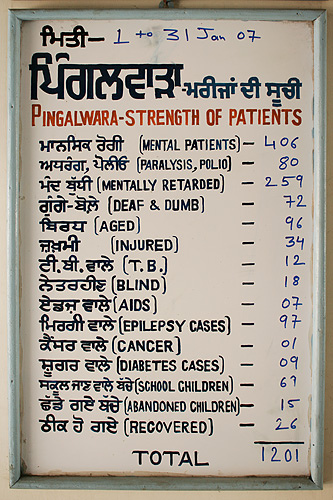
List of Pingalwara patients in January 2007 |
Care of the destitute in India is a herculean task and Bhagat ji found a suitable successor in Dr Inderjit Kaur before his demise in 1992.
Today Pingalwara has enlarged its sphere of activities and is providing shelter, medical facilities and care for more than 1700 residents.
Pingalwara's truths are not discovered from books, but from the realities of life.
Why were healthy babies abandoned on the road side?
Why there are so many mentally challenged and old people without homes; why are old men left on the road side?
Why have mentally challenged woman been sexually abused, made pregnant and then thrown out?
Why are homeless children not with their parents?
Each of the 1700 residents of Pingalwara raises similar questions.
Most of the residents on arrival are in a pitiable state of mental and physical health and cannot even recall their names. Slowly and surely they are nurtured back to health. Some of them are reunited with their families.
Many residents are housed in 6 branches in different cities of Punjab.
All the branches have spacious but limited wards, well stocked dispensaries and care takers who work around the clock to look after the residents. Many of these are suffering from chronic or incurable diseases and are going to spend their entire life in Pingalwara.
It would not suffice to provide only food, medicines, clothes and shelter to the residents. Their emotional and development requirements need to be considered and provided for. Special attention needs to be paid to their recreational activities. It is only through these all-round efforts that every year 200 patients recover from their ailment and are re-united with their families.
Young boys and girls are housed in separate hostels in a clean and nourishing environment. The have all the modern amenities for their healthy growth.
And when they grow up they are married off into suitable families.
Services
For immediate and continuous medical requirements of the residents Pingalwara also provides specialist medical services.
Prosthetic and Orthotics Centre is the only of its kind in whole of Northern India. It provides all suitable devices for the Pingalwara patients and those from outside. From 2003 to mid July 2012, 3475 devices were provided; 1086 devices were repaired.
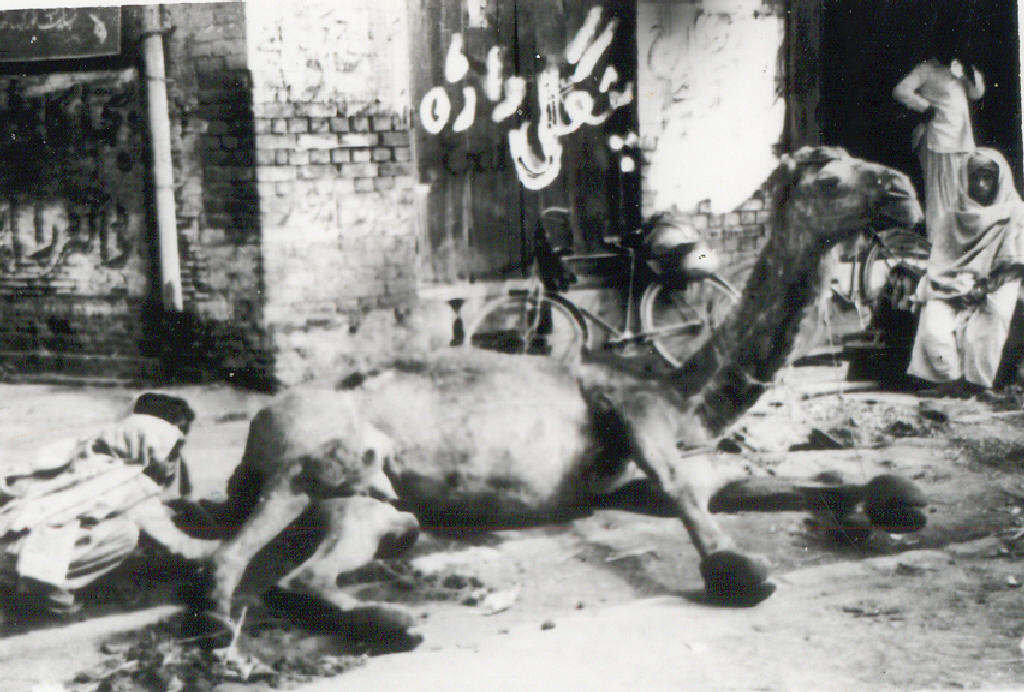
Pingalwara also cared for animals (1953) |
Dental centres at Chandigarh and Amritsar provide dental care to the residents and needy persons free of charge.
A well equipped Physiotherapy centre meets all the needs of Pingalwara patients and on an average 50 patients are treated every day. Poor and needy patients from outside are also given free treatment.
There is a state of the art Micro-Surgery Operation Theatre where major and minor operations are carried out. Two deaf children have been provided with Cochlear Implants and more implants are in the offing.
Sensory Rooms are an important part in the development of many of the children be it for visual stimulation, sounds, textures or movement.
Loneliness, helplessness and boredom are the three plagues that account for most of the suffering among older adults. To overcome this Apna Ghars as a concept have been introduced. Here the elderly people live together and share their life experiences.
Bhagat Ji was of the view that the state of the poor and deprived sections of the society cannot be improved till they are educated. Keeping this in view Pingalwara is running 5 schools.
Only nature can show us the way out of this quagmire and it comes in the form of zero budget natural farming also known as Spiritual farming. In Spiritual farming all the food is grown naturally. Pingalwara has a 32 acre model farm and research centre where Spiritual farming is practiced. Today Pingalwara is producing more and more natural food than ever thought possible. Farmers from many of the states of the country are thronging to the see this miracle and learn new farming techniques. Information about Spiritual farming is available in the form books and CDs and is freely available from Pingalwara.
Our social, economic, health and ethical issues cannot be resolved unless people are made aware of the problems and their solutions. To achieve this more than 10,000 pages are printed in Pingalwara press every day on various issues for free distribution in the form of books, booklets and pamphlets. Lectures/seminars and exhibitions on important issues are held to find suitable solutions.

Patients at Pingalwara |
The human spirit can soar to any level. These people are not destitute, bonds develop, love blossoms, hopes are kindled and lives are taking beautiful shapes. This has been possible only with gracious help from all of you.
Pingalwara patients are fed, housed and looked after, thanks to generous support. The unclaimed bodies of the deceased are donated to Government Medical College, Amritsar for research and teaching purposes.
Pingalwara has branches in Amritsar (main branch), Manawala (Amritsar district), Chandigarh, Goindwal, Jalandhar and Sangrur.
The main branch houses the administrative complex, a female ward, children's ward, rehabilitation centre, printing press, dispensary, medical lab, dental centre and the common kitchen. Pingalwara also operates a free drug dispensary, a blood bank, a shelter for intellectually disabled children and a free primary school in the slum area of Amritsar city.
Poor and abandoned children raised by Pingalwara are helped re-establish themselves in society at the completion of their school education. An ambulance and a basic operation room is available for trauma care of accident victims.
Pingalwara's Manawala branch has an area of 25 acres (100,000 m2) comprising a senior secondary school, SOS homes, wards for mentally ill patients as well as for old aged and a physiotheripic centre.
In 2006, Pingalwara bought 35 acres (140,000 m2) of land near Jandiala, 20 km from Amritsar. There is an organic farm. Fresh fruits and vegetables are grown without using pesticides.
 Bhagat Puran Singh
Bhagat Puran Singh
 Bhagat Puran Singh's Award
Bhagat Puran Singh's Award
 Pingalwara Photo Gallery 1
Pingalwara Photo Gallery 1
 Pingalwara Photo Gallery 2
Pingalwara Photo Gallery 2
 Pingalwara Photo Gallery 3
Pingalwara Photo Gallery 3
If you are ever fortunate enough to visit India, please make time and visit your nearest Pingalwara branch. Just arrive, go to reception and ask to be shown around. Pingalwara volunteers always willingly help. Any donations and/ or gifts (large or small) are gratefully received by Pingalwara.
Most likely, you will remember the visit for the rest of your lives.


